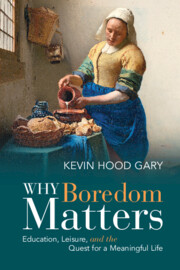1 - The Morality of Boredom and a Brief History of Leisure
Published online by Cambridge University Press: 21 July 2022
Summary
In the spate of scholarship on boredom over the past two decades, the moral character of boredom has received little attention (Elpidorou, ). This is striking because boredom’s ancient precursor, acedia, was considered to be one of the deadliest vices and the source of several other destructive vices, including gluttony, lust, and anger (Bunge, ). In this respect, modern boredom arguably parallels acedia, as it is also casually linked to numerous problematic, arguably immoral behaviors. The state of boredom is morally significant because it adversely impacts both moral reasoning and the vision of flourishing that guides moral reasoning. Boredom is not simply a mood we must endure but a state of mind (certainly impacted by circumstances) that we need not be captive to. Its moral significance also needs to be underscored because there is something at stake: We can do something about what we find to be boring (boredom assessment) and how we contend with this mood state (boredom endurance).
Keywords
- Type
- Chapter
- Information
- Why Boredom MattersEducation, Leisure, and the Quest for a Meaningful Life, pp. 7 - 20Publisher: Cambridge University PressPrint publication year: 2022

